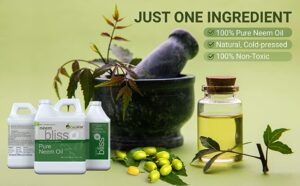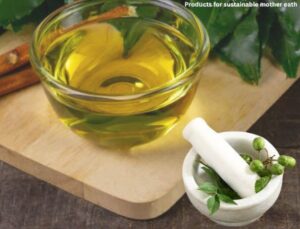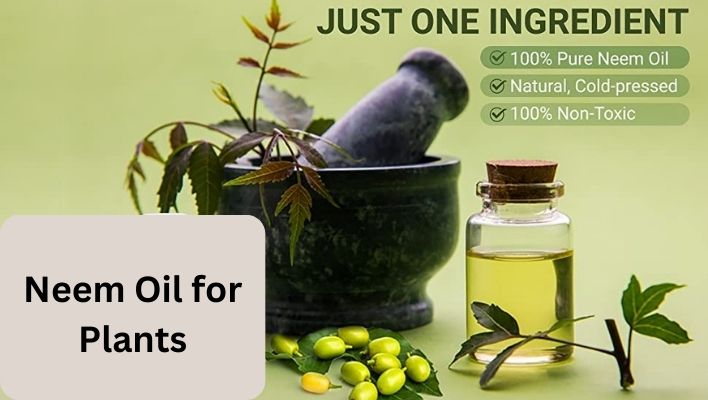Neem oil is a natural product used for centuries in various parts of the world for its medicinal and insecticidal properties. It is derived from the neem tree, native to India and other parts of Southeast Asia. In this article, we’ll look closer at neem oil and its benefits for plant health.
Neem oil is extracted from the seeds of the neem tree. The seeds are first crushed to extract the oil, which is then filtered and processed into a usable form. Neem oil contains various compounds beneficial for plants, including azadirachtin, Nimbin, and Salannin.
The use of neem oil for plant health dates back thousands of years. It was first used in India as a natural remedy for various ailments, including skin conditions, digestive issues, and infections. Later on, neem oil was discovered to have insecticidal properties and was used as a natural pesticide for crops.
Today, neem oil is widely used in the agricultural industry as a natural insecticide and fungicide. Its ability to repel and kill pests like aphids, mites, and thrips has made it a popular choice for organic and sustainable farmers.
In addition to its insecticidal properties, neem oil is known for boosting plant immunity and promoting healthy growth. Its antifungal properties effectively prevent and treat fungal diseases like powdery mildew and rust. Below, we’ll look at the benefits of using neem oil for plants, how to use it, and the precautions to take.
Composition and Properties of Neem Oil
Neem oil is extracted from the seeds of the neem tree, a tropical evergreen tree native to India and other parts of Southeast Asia. The oil is a complex mixture of over 140 compounds, including fatty acids, triglycerides, and bioactive compounds.
One of the most well-known properties of neem oil is its antimicrobial and insecticidal properties. Neem oil has been used for centuries as a natural insecticide, and it is effective against a wide range of pests, including aphids, mites, and whiteflies.
Neem oil disrupts the insect’s hormonal system, preventing it from feeding and reproducing. In addition to its insecticidal properties, neem oil has antifungal and antibacterial properties.
It can control fungal diseases such as powdery mildew and rust and bacterial diseases such as leaf spots and blight. Neem oil disrupts the microorganisms’ cell walls, preventing them from growing and reproducing.
Another important property of neem oil is its environmental safety. Unlike synthetic pesticides, neem oil is biodegradable and does not persist in the environment. It is also safe for beneficial insects such as bees and ladybugs, which are important for pollination and natural pest control.
Neem oil is a powerful tool for promoting plant health and controlling pests and diseases. Its unique composition and properties make it a safe and effective alternative to synthetic pesticides, and it has been used for centuries in traditional medicine and agriculture. The next section will explore using neem oil on plants for maximum effectiveness.
Benefits of using neem oil for plants
Neem oil is a versatile natural product that offers a wide range of benefits for plant health. Here are some of the top benefits of using neem oil on your plants:
Natural insecticide properties:
Neem oil is an effective natural insecticide controlling many pests, including aphids, mites, and whiteflies. It disrupts the insects’ hormonal system, preventing them from feeding and reproducing.
Antifungal properties:
Neem oil can also control various fungal diseases, including powdery mildew and rust. Its antifungal properties work by disrupting the cell walls of the fungi, preventing them from growing and reproducing.
Boosts plant immunity:
Neem oil contains compounds that stimulate the plant’s immune system, making it more resistant to pests and diseases. This can help reduce the need for synthetic pesticides and fungicides.
Improvement of soil health:
When neem oil is applied to the soil, it can improve soil health by promoting the growth of beneficial microorganisms. These microorganisms can help break down organic matter and make nutrients more available to the plant.
Promotes plant growth:
Neem oil contains compounds that can stimulate plant growth and development. It can also help improve the plant’s uptake of nutrients, leading to healthier and stronger plants.
Biodegradable and safe for the environment:
Unlike synthetic pesticides, neem oil is biodegradable and does not persist in the environment. It is also safe for beneficial insects and other wildlife, making it an eco-friendly option.
Neem oil as a leaf polish:
Neem oil can also be used as a leaf polish, giving plants a healthy shine and preventing dust and other particles from settling on the leaves.
Overall, neem oil is a powerful tool for promoting plant health and reducing the use of synthetic pesticides and fungicides. Its natural properties make it a safe and effective alternative used for centuries in traditional medicine and agriculture.

How to use neem oil on plants
Neem oil is easy to use and can be applied in various ways. Here are some tips on how to use neem oil on your plants:
- Preparation of neem oil solution: Neem oil is usually sold in concentrated form and needs to be diluted with water before use. To make a neem oil solution, mix the desired amount of neem oil with water and a few drops of dish soap (to help the solution stick to the plant’s leaves).
- Dilution ratios for different applications: The dilution ratio of neem oil will depend on the application. A 0.5% solution (5ml of neem oil per liter of water) is recommended for general pest control. A stronger solution (up to 2%) can be used for more severe infestations.
- Application methods: Neem oil can be applied in various ways, including spraying, drenching, and soil application. For best results, apply neem oil directly to the affected areas of the plant, making sure to cover both the top and bottom of the leaves.
- How often to apply neem oil: The frequency of neem oil application will depend on the severity of the pest or disease problem. Neem oil can be applied weekly for general pest control and every 3-4 days for more severe infestations.
- Best time of day to apply neem oil: Neem oil is best applied in the early morning or late afternoon when the sun is not too strong. This will help prevent the leaves from burning and ensure the neem oil is absorbed properly.
Always read the label instructions carefully before using neem oil and test it on a small area of the plant before applying it to the entire plant. With proper use, neem oil can be a powerful tool for promoting plant health and controlling pests and diseases.
Precautions when using neem oil on plants
While neem oil is generally safe for plants and the environment, there are a few precautions to keep in mind when using it:
- Avoid using neem oil in direct sunlight: Applying neem oil in direct sunlight can cause the leaves to burn. It’s best to apply neem oil early in the morning or late in the afternoon when the sun is not too strong.
- Use protective gear when applying neem oil: It can cause skin and eye irritation, so it’s important to wear gloves, long sleeves, and goggles when applying it.
- Do not apply neem oil excessively: Overuse of neem oil can harm plants, so it’s important to follow the recommended dilution ratios and application frequency.
- Do not use neem oil on plants that are sensitive to it: While it is safe for most plants, some plants may be sensitive to it. Before using neem oil on a new plant, it’s best to test it on a small area first to make sure the plant doesn’t have an adverse reaction.
By taking these precautions, you can safely and effectively use neem oil to promote plant health and control pests and diseases.
Neem oil as a solution for common plant problems
Neem oil is a versatile solution that can help solve various common plant problems. Here are some examples:
- Control of pests like aphids, mites, and thrips: Neem oil has insecticidal properties that make it effective against various pests. It disrupts the insects’ hormone systems and prevents them from feeding and reproducing. To control pests with neem oil, mix a small amount of neem oil with water and apply it to the affected plant using a spray bottle.
- Prevention of fungal diseases like powdery mildew and rust: Neem oil has antifungal properties that are effective against fungal diseases. It works by disrupting the fungus’s cell membrane and preventing it from spreading. To prevent fungal diseases with neem oil, mix a small amount of neem oil with water and apply it to the plant’s leaves and stems using a spray bottle.
- Treatment of plant diseases like black spot and fire blight: Neem oil has antibacterial properties that are effective against bacterial diseases. It works by disrupting the bacteria’s cell walls and preventing them from multiplying. To treat bacterial diseases with neem oil, mix a small amount of neem oil with water and apply it to the affected plant using a spray bottle.
Using neem oil to control pests and diseases can help plants stay healthy and thrive.
Neem Oil for Specific Plants and Pests
Neem oil can be used to protect a wide range of plants from pests and diseases. Here are some examples of how neem oil can be used for specific plants and pests:
- Neem oil for vegetable gardens: Neem oil is a great natural solution for protecting gardens from pests and diseases. It can control common garden pests like aphids, whiteflies, and spider mites. To apply neem oil to vegetable plants, dilute it with water and spray it onto the leaves and stems.
- Neem oil for fruit trees: Neem oil can protect fruit trees from pests and diseases, including fruit flies and powdery mildew. To use neem oil on fruit trees, dilute it with water and spray it onto the leaves and fruit.
- Neem oil for houseplants: Neem oil is safe for houseplants and can help prevent pests like spider mites and mealybugs. To apply neem oil to houseplants, dilute it with water and spray it onto the leaves and stems.
- Neem oil for controlling aphids, whiteflies, and other common garden pests: Neem oil is effective against a wide range of common garden pests. To control pests with neem oil, mix a small amount of neem oil with water and apply it to the affected plants using a spray bottle.
When using neem oil on specific plants and pests, follow the instructions carefully and avoid applying too much neem oil, as this can damage the plants. With proper use, neem oil can be a safe and effective solution for protecting your plants and garden from pests and diseases.

Neem Oil Alternatives and Precautions
While neem oil is a popular and effective solution for controlling pests and diseases in plants, there are also alternative methods that you can consider. Here are some alternatives to neem oil:
- Alternative pest and disease control methods: There are many natural methods for controlling pests and diseases in plants, including companion planting, organic fertilizers, and beneficial insects. You can also use physical methods like handpicking pests or using row covers to prevent infestations.
- Other natural insecticides: In addition to neem oil, there are other natural insecticides that you can use to control pests, including diatomaceous earth, garlic spray, and insecticidal soap.
- Synthetic insecticides: While synthetic insecticides effectively control pests, they can harm the environment and leave residues on your plants. If you choose to use synthetic insecticides, be sure to follow the instructions carefully and avoid using them excessively.
It is important to use neem oil carefully and follow the precautions to avoid potential side effects.
Here are some precautions to keep in mind:
- Precautions when using neem oil on plants: Wear protective gear like gloves and a mask when applying neem oil to avoid skin and respiratory irritation. Avoid using neem oil in direct sunlight, as it can cause leaf burn.
- Potential side effects of neem oil: While neem oil is generally safe to use, it can cause allergic reactions in some people. Ingesting neem oil can also cause vomiting, diarrhea, and other symptoms.
Using neem oil and alternative methods carefully and responsibly lets you keep your plants healthy and free of pests and diseases.
Neem Oil for Plants FAQs
How often should neem oil be applied to plants?
Neem oil can be applied every 7 to 14 days, depending on the severity of the pest or disease problem. It’s important not to over-apply neem oil, as it can damage plants.
Is neem oil harmful to bees?
Neem oil is generally considered safe for bees and other beneficial insects when used according to label instructions. However, it’s best to avoid spraying neem oil on plants when bees are actively foraging.
Does neem oil have a strong smell?
Neem oil has a distinctive odor that can be described as nutty or garlicky. Some people find the smell unpleasant, but it usually dissipates quickly after application.
Can neem oil be used in hydroponics?
Neem oil can be used in hydroponic systems, but it’s important to use pure, cold-pressed neem oil that is free of additives and emulsifiers.
Can neem oil be used on all types of plants?
Neem oil can be used on most types of plants, including vegetables, fruits, herbs, and ornamentals. However, some plants may be sensitive to neem oil, so it’s always best to test a small area before treating the entire plant.
Can neem oil be used during the flowering or fruiting stages?
Yes, neem oil can be used during the flowering and fruiting stages of plant growth. However, avoiding spraying the flowers directly is important to prevent damage.
Is neem oil safe for pets and humans?
Neem oil is generally safe for pets and humans when used according to label instructions. However, it’s important to avoid direct contact with neem oil and to wash hands thoroughly after handling.
What are the alternatives to neem oil for plant care?
Several alternative pest and disease control methods exist, including beneficial insects, companion planting, and homemade remedies like garlic and soap. Synthetic insecticides can also be used but are not considered environmentally friendly.
Conclusion
Neem oil is a powerful and natural solution for maintaining the health of your plants. Its antimicrobial and insecticidal properties make it an effective alternative to synthetic chemicals that can harm the environment and your plants.
By using neem oil, you can control common garden pests and prevent the development of fungal diseases. Additionally, neem oil can improve soil health, boost plant immunity, and promote plant growth.
However, following the proper precautions when using neem oil on plants is important, such as avoiding excessive application and using protective gear. It’s also recommended to consider alternative pest and disease control methods and be aware of potential side effects and limitations of neem oil use.
Neem oil is a valuable tool in organic gardening and plant care. Incorporating it into your plant care routine can help ensure healthy and thriving plants.


